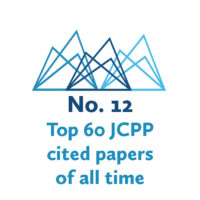Aggression
-

Reciprocal relations between interparental aggression and symptoms of oppositional defiant and conduct disorders: a seven-wave cohort study of within-family effects from preschool to adolescence
Open Access paper from the JCPP – ‘This study examined whether increased interparental aggression predicted increased symptoms of oppositional defiant disorder (ODD) and conduct disorder (CD) from preschool to adolescence and vice versa.’ Habib Niyaraq Nobakht (pic) et al.
Read more -

Sexual orientation and mental health in a US cohort of children: a longitudinal mediation study
Paper from the JCPP – ‘We examined longitudinal associations between sexual orientation and mental health over 2 years in a US cohort of children (aged 9–10 at baseline) and two explanatory factors (increased social problems such as getting teased and decreased perceived school safety)’. Brian A. Feinstein (pic) et al.
Read more -

Genome-wide DNA methylation analysis of aggressive behaviour: a longitudinal population-based study
Open Access paper from the JCPP – ‘We examined the association between aggressive behaviour, as measured by Life History of Aggression (LHA) total score and DNAm levels both assessed at age 25.’ Ehsan Pishva (pic) et al.
Read more -

Childhood behaviour patterns linked with romantic partnering in adulthood
Children with behavioural disorders, such as ADHD or conduct disorder, are more likely to experience partnership problems in adulthood, including partner conflict and lower relationship satisfaction.
Read more -

Is aggression linked with academic performance in young people?
A new study published in the Journal of Child Psychology and Psychiatry has investigated the association between aggression and academic performance in >27,000 young people enrolled in four twin cohorts comprising the ACTION consortium.
Read more -

Conduct Disorders and Aggression Editorial
This editorial edition of The Bridge is on the topic of conduct disorders and aggression.
Read more -

Conduct Disorders and Aggression edition
Children and young people with conduct disorders often have additional comorbid learning difficulties, neurodevelopmental or mental health disorders, so it is important to be able to assess, recognise and offer appropriate interventions. The effects on a young person’s future and society may be significant if not managed well.
Read more -

Aggression toward siblings during the preschool years: When does it become atypical?
Most children grow up with siblings. During early childhood, siblings spend a great deal of time together and must navigate challenging situations such as sharing toys and parental attention, features that make conflict inevitable and often emotionally intense.
Read more -

Most Cited JCPP Articles #12 of 60
Most cited JCPP papers #12 of 60: Research Review: The importance of callous-unemotional traits for developmental models of aggressive and antisocial behavior
Read more -

Most Cited JCPP Articles #19 of 60
Most cited JCPP papers #19 of 60: Online aggressor/targets, aggressors, and targets: a comparison of associated youth characteristics
Read more